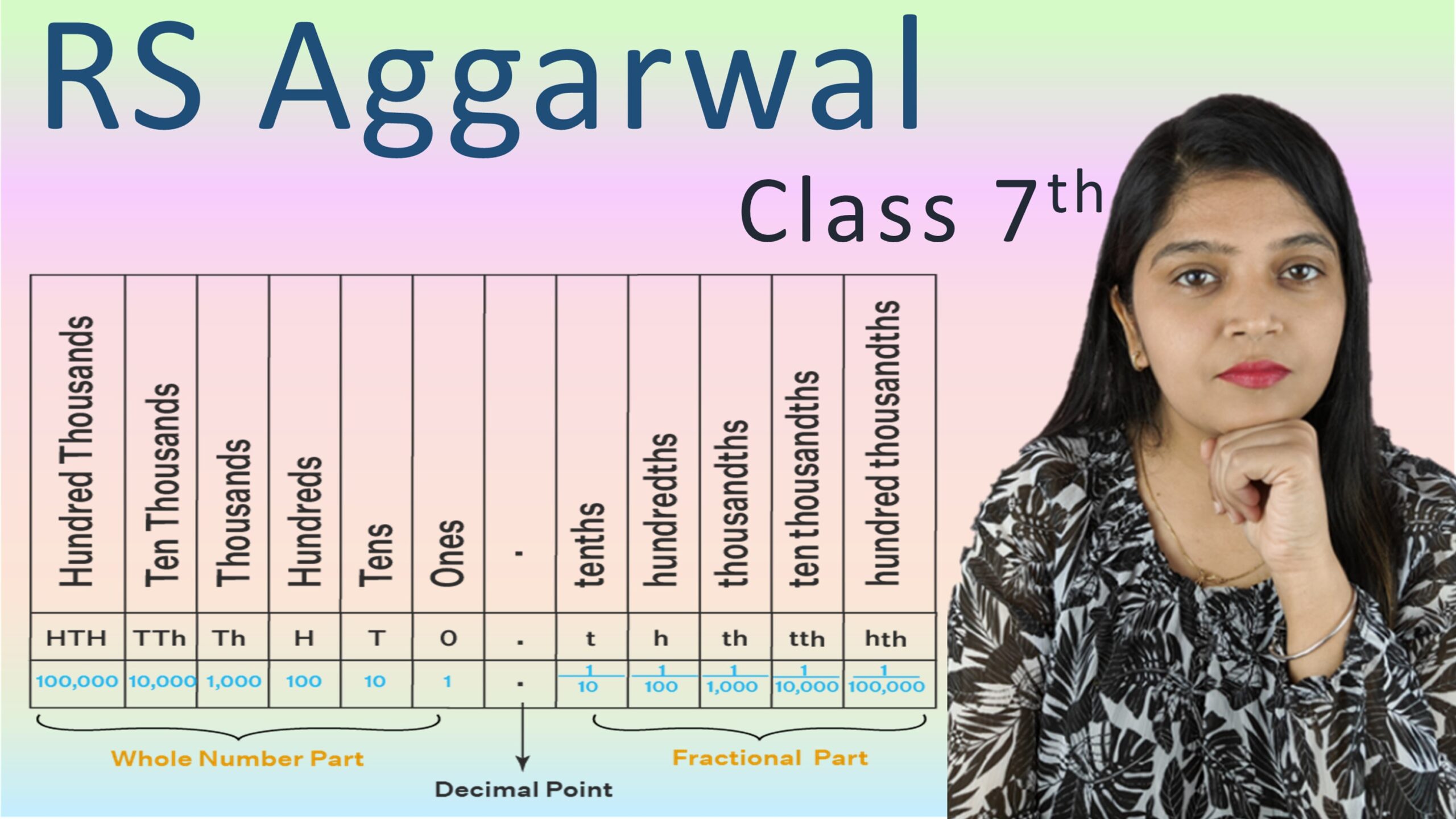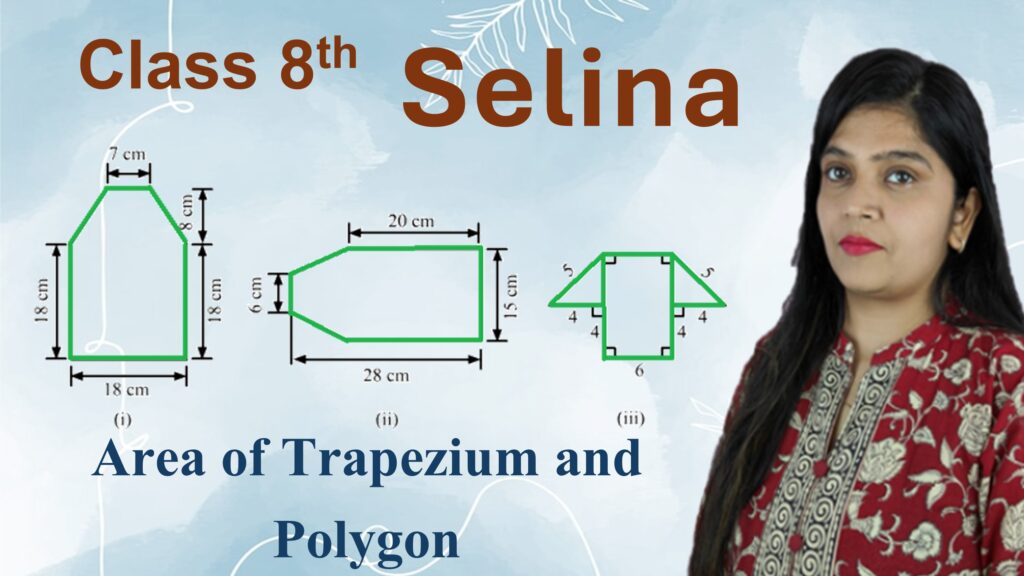Exercise: 3-C
Q1: Multiply:
i. \( 6.5 \times 10 \)
\[
6.5 \times 10 = 65
\]Answer: 65
ii. \( 0.8 \times 10 \)
\[
0.8 \times 10 = 8
\]Answer: 8
iii. \( 9.07 \times 10 \)
\[
9.07 \times 10 = 90.7
\]Answer: 90.7
iv. \( 2.345 \times 10 \)
\[
2.345 \times 10 = 23.45
\]Answer: 23.45
v. \( 4.63 \times 100 \)
\[
4.63 \times 100 = 463
\]Answer: 463
vi. \( 8.279 \times 100 \)
\[
8.279 \times 100 = 827.9
\]Answer: 827.9
vii. \( 7.8 \times 100 \)
\[
7.8 \times 100 = 780
\]Answer: 780
viii. \( 0.09 \times 100 \)
\[
0.09 \times 100 = 9
\]Answer: 9
ix. \( 0.283 \times 1000 \)
\[
0.283 \times 1000 = 283
\]Answer: 283
x. \( 6.25 \times 1000 \)
\[
6.25 \times 1000 = 6250
\]Answer: 6250
xi. \( 5.4 \times 1000 \)
\[
5.4 \times 1000 = 5400
\]Answer: 5400
xii. \( 0.3 \times 1000 \)
\[
0.3 \times 1000 = 300
\]Answer: 300
Q2: Multiply:
i. \( 2.4 \times 16 \)
First, we multiply 24 by 16.
Clearly, 24 × 16 = 384.
Sum of decimal places in given decimals = (1) = 1.
So, the product contains 1 place of decimal.
Answer: 38.4
24 × 16 ------ 144 ← (24 × 6) 240 ← (24 × 10, shifted one position left) ------ 384
ii. \( 3.45 \times 17 \)
First, we multiply 345 by 17.
Clearly, 345 × 17 = 5865.
Sum of decimal places in given decimals = (2) = 2.
So, the product contains 2 places of decimal.
Answer: 58.65
345 × 17 ------ 2415 ← (345 × 7) 3450 ← (345 × 10, shifted one position left) ------ 5865
iii. \( 0.86 \times 14 \)
First, we multiply 86 by 14.
Clearly, 86 × 14 = 1204.
Sum of decimal places in given decimals = (2) = 2.
So, the product contains 2 places of decimal.
Answer: 12.04
86 × 14 ------ 344 ← (86 × 4) 860 ← (86 × 10, shifted one position left) ------ 1204
iv. \( 2.68 \times 30 \)
First, we multiply 268 by 30.
Clearly, 268 × 30 = 8040.
Sum of decimal places in given decimals = (2) = 2.
So, the product contains 2 places of decimal.
Answer: 80.4
268 × 30 ------ 8040 ← (268 × 30) ------ 8040
v. \( 0.023 \times 65 \)
First, we multiply 23 by 65.
Clearly, 23 × 65 = 1495.
Sum of decimal places in given decimals = (3) = 3.
So, the product contains 3 places of decimal.
Answer: 1.495
23 × 65 ------ 115 ← (23 × 5) 1380 ← (23 × 60, shifted one position left) ------ 1495
vi. \( 0.0006 \times 15 \)
First, we multiply 6 by 15.
Clearly, 6 × 15 = 90.
Sum of decimal places in given decimals = (4) = 4.
So, the product contains 4 places of decimal.
Answer: 0.009
6 × 15 ------ 90 ← (6 × 15) ------ 90
Q3: Find the product:
i. \( 5.6 \times 1.4 \)
First, we multiply 56 by 14.
Clearly, 56 × 14 = 784.
Sum of decimal places in given decimals = (1 + 1) = 2.
So, the product contains 2 places of decimal.
Answer: 7.84
56 × 14 ------ 224 ← (56 × 4) 560 ← (56 × 10, shifted one position left) ------ 784
ii. \( 2.35 \times 7.2 \)
First, we multiply 235 by 72.
Clearly, 235 × 72 = 16920.
Sum of decimal places in given decimals = (2 + 1) = 3.
So, the product contains 3 places of decimal.
Answer: 16.92
235 × 72 ------ 470 ← (235 × 2) 1645 ← (235 × 70, shifted one position left) ------ 16920
iii. \( 0.37 \times 0.26 \)
First, we multiply 37 by 26.
Clearly, 37 × 26 = 962.
Sum of decimal places in given decimals = (2 + 2) = 4.
So, the product contains 4 places of decimal.
Answer: 0.0962
37 × 26 ------ 222 ← (37 × 6) 740 ← (37 × 20, shifted one position left) ------ 962
iv. \( 0.74 \times 6.7 \)
First, we multiply 74 by 67.
Clearly, 74 × 67 = 4958.
Sum of decimal places in given decimals = (2 + 1) = 3.
So, the product contains 3 places of decimal.
Answer: 4.958
74 × 67 ------ 518 ← (74 × 7) 4440 ← (74 × 60, shifted one position left) ------ 4958
v. \( 5.64 \times 0.08 \)
First, we multiply 564 by 8.
Clearly, 564 × 8 = 4512.
Sum of decimal places in given decimals = (2 + 2) = 4.
So, the product contains 4 places of decimal.
Answer: 0.4512
564 × 8 ------ 4512
vi. \( 2.75 \times 1.7 \)
First, we multiply 275 by 17.
Clearly, 275 × 17 = 4675.
Sum of decimal places in given decimals = (2 + 1) = 3.
So, the product contains 3 places of decimal.
Answer: 4.675
275 × 17 ------ 1925 ← (275 × 7) 2750 ← (275 × 10, shifted one position left) ------ 4675
vii. \( 0.04 \times 0.36 \)
First, we multiply 4 by 36.
Clearly, 4 × 36 = 144.
Sum of decimal places in given decimals = (2 + 2) = 4.
So, the product contains 4 places of decimal.
Answer: 0.0144
4 × 36 ------ 144
viii. \( 34.2 \times 1.86 \)
First, we multiply 342 by 186.
Clearly, 342 × 186 = 63612.
Sum of decimal places in given decimals = (1 + 2) = 3.
So, the product contains 3 places of decimal.
Answer: 63.612
342 × 186 ------ 2052 ← (342 × 6) 6840 ← (342 × 80, shifted one position left) 34200 ← (342 × 100, shifted two positions left) ------ 63612
ix. \( 0.028 \times 0.9 \)
First, we multiply 28 by 9.
Clearly, 28 × 9 = 252.
Sum of decimal places in given decimals = (3 + 1) = 4.
So, the product contains 4 places of decimal.
Answer: 0.0252
28 × 9 ------ 252
Q4: Find the product:
i. \( 2.3 \times 0.23 \times 0.1 \)
First, we multiply \( 23 \times 23 = 529 \).
Next, we multiply the result by \( 1 \) (the decimal 0.1).
Sum of decimal places in given decimals = (1 + 2 + 1) = 4.
So, the product contains 4 places of decimal.
Answer: 0.0529
23 × 23 ------ 529 ← (23 × 23)
ii. \( 1.2 \times 3.5 \times 0.3 \)
First, we multiply \( 12 \times 35 = 420 \).
Next, we multiply the result by \( 3 \) (the decimal 0.3).
Sum of decimal places in given decimals = (1 + 1 + 1) = 3.
So, the product contains 3 places of decimal.
Answer: 1.26
12 × 35 ------ 420 ← (12 × 35) 420 × 3 ------ 1260 ← (420 × 3)
iii. \( 0.6 \times 1.5 \times 0.7 \)
First, we multiply \( 6 \times 15 = 90 \).
Next, we multiply the result by \( 7 \) (the decimal 0.7).
Sum of decimal places in given decimals = (1 + 1 + 1) = 3.
So, the product contains 3 places of decimal.
Answer: 0.63
15 × 6 ------ 90 ← (6 × 15) 90 × 7 ------ 630 ← (90 × 7)
iv. \( 0.2 \times 0.2 \times 0.02 \)
First, we multiply \( 2 \times 2 = 4 \).
Next, we multiply the result by \( 2 \) (the decimal 0.02).
Sum of decimal places in given decimals = (1 + 1 + 2) = 4.
So, the product contains 4 places of decimal.
Answer: 0.0008
2 × 2 ------ 4 ← (2 × 2) 4 × 2 ------ 8 ← (4 × 2)
v. \( 1.1 \times 0.1 \times 0.11 \)
First, we multiply \( 11 \times 11 = 121 \).
Next, we multiply the result by \( 1 \) (the decimal 0.1).
Sum of decimal places in given decimals = (1 + 1 + 2) = 4.
So, the product contains 4 places of decimal.
Answer: 0.121
11 × 11 ------ 121 ← (11 × 11) 121 × 1 ------ 121 ← (121 × 1)
vi. \( 0.6 \times 0.06 \times 0.006 \)
First, we multiply \( 6 \times 6 = 36 \).
Next, we multiply the result by \( 6 \) (the decimal 0.006).
Sum of decimal places in given decimals = (1 + 2 + 3) = 6.
So, the product contains 6 places of decimal.
Answer: 0.000216
6 × 6 ------ 36 ← (6 × 6) 36 × 6 ------ 216 ← (36 × 6)
Q5: Evaluate:
i. \( (1.3)^2 \)
13 × 13 ----- 39 ← (13 × 3) 130 ← (13 × 10) ----- 169
There are 2 decimal places (1 in each factor), so the product will have 2 decimal places.
Answer: 1.69
ii. \( (0.06)^2 \)
6 × 6 ----- 36
There are 4 decimal places total (2 in each 0.06), so the product will be:
Answer: 0.0036
iii. \( (0.2)^3 \)
Step 1: \( 0.2 \times 0.2 = 0.04 \)
Step 2: \( 0.04 \times 0.2 = 0.008 \)
2 × 2 ----- 4 4 × 2 ----- 8
Decimal places: 1 + 1 + 1 = 3 decimal places
Answer: 0.008
iv. \( (0.8)^3 \)
Step 1: \( 0.8 \times 0.8 = 0.64 \)
Step 2: \( 0.64 \times 0.8 = 0.512 \)
8 × 8 ----- 64 64 × 8 ----- 512
Decimal places: 1 + 1 + 1 = 3 decimal places
Answer: 0.512
Q6: The cost of one pen is ₹42.25. Find the cost of one dozen such pens.
The cost of one pen is ₹42.25.
To find the cost of one dozen pens, we multiply the cost of one pen by 12.
\[
\text{Cost of 12 pens} = 42.25 \times 12
\]Now, performing the multiplication:
4225 × 12 ------ 8450 ← (4225 × 2) 42250 ← (4225 × 10) ------ 50700
Since there are two decimal places in ₹42.25, the product will also have two decimal places.
So, the cost of one dozen pens is ₹507.00.
Answer: ₹507.00
Q7: A car moves at a constant speed of 56.4 km per hour. How much distance does it cover in 3.5 hours?
To find the distance covered, we use the formula: \[ \text{Distance} = \text{Speed} \times \text{Time} \]Given: – Speed = 56.4 km/h – Time = 3.5 hoursNow, we multiply the speed by the time to get the distance:\[ \text{Distance} = 56.4 \times 3.5 \]We perform the multiplication:
564 × 35 ------ 2820 ← (564 × 5) 16920 ← (564 × 30) ------ 19740
Since there is one decimal place in 56.4, the product will have one decimal place.
Thus, the distance covered is 197.4 km.
Answer: 197.4 km
Q8: A room is 4.5 m long and 3.8 m broad. Calculate the area of the floor of the room.
To find the area of the floor, we use the formula for the area of a rectangle: \[ \text{Area} = \text{Length} \times \text{Breadth} \]Given: – Length = 4.5 m – Breadth = 3.8 mNow, we multiply the length by the breadth to get the area:\[ \text{Area} = 4.5 \times 3.8 \]We perform the multiplication:
45 × 38 ------ 360 ← (45 × 8) 1350 ← (45 × 30) ------ 1710
Since there is one decimal place in 4.5 and one decimal place in 3.8, the product will have two decimal places.
Thus, the area of the floor is 17.10 square meters.
Answer: 17.10 m²
Q9: The cost of 1 litre of refined oil is ₹124.75. What is the cost of 6.2 litres of this oil?
To find the total cost, we use the formula: \[ \text{Total Cost} = \text{Cost per litre} \times \text{Quantity (litres)} \]Given: – Cost per litre = ₹124.75 – Quantity = 6.2 litresNow, we multiply the cost per litre by the quantity to get the total cost:\[ \text{Total Cost} = 124.75 \times 6.2 \]We perform the multiplication:
12475 × 62 ------ 24950 ← (12475 × 2) 749850 ← (12475 × 60) ------ 773450
Since there are two decimal places in ₹124.75, the product will also have two decimal places.
Thus, the total cost is ₹773.45.
Answer: ₹773.45






Leave a Comment